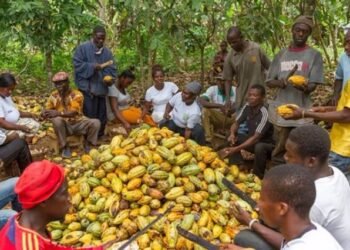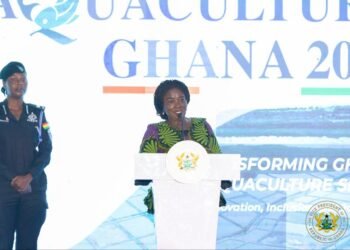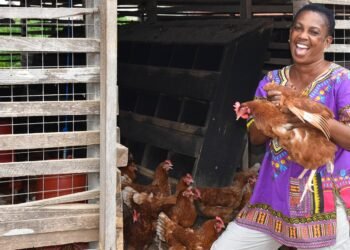The Council for Scientific and Industrial Research of the Savannah Agricultural Research Institute (CSIR-SARI) is championing a significant shift in farming practices among smallholder farmers in northern Ghana, particularly targeting women.
By promoting the use of compost and biochar, CSIR-SARI aims to provide sustainable and cost-effective alternatives to chemical fertilizers, which can be prohibitively expensive for many farmers.
These two innovative technologies are poised to revolutionize soil management and crop productivity. Compost, a nutrient-rich mixture of decomposed organic materials such as animal droppings, is well-known for enhancing soil fertility and structure.
Biochar, on the other hand, is a carbon-rich product derived from organic materials through pyrolysis—a process of burning organic matter in the absence of oxygen. Both methods not only improve soil health but also boost crop yields, offering a sustainable solution for smallholder farmers.
CSIR-SARI’s initiative includes intensive training sessions on compost and biochar production for smallholder farmers, with a special focus on women. In the Upper West Region, four communities have been selected to benefit from this program: Balazu and Zinye in the Wa East District, and Nimbare and Boi in the Jirapa Municipality. Around 120 smallholder farmers, predominantly women, have already participated in the hands-on training sessions, gaining practical knowledge in preparing and utilizing these organic amendments.
Mr. Alhassan Nuhu Jinbaani, an Agricultural Economist at CSIR-SARI, emphasized the importance of this training during sessions in the Balazu and Zinye communities. He highlighted that the initiative is part of a broader project aimed at promoting the cultivation of Bambara groundnuts—a nutritious and drought-resistant legume.
The project, titled “Promoting Bambara Groundnuts Production, Adoption, and Utilization for Food and Nutrition Security and Increased Income for Smallholder Farmers in Northern Ghana,” is funded by Grow Further, a USA-based organization.
This three-year project not only focuses on enhancing soil fertility through compost and biochar but also seeks to improve food and nutrition security, climate resilience, and income for smallholder farmers. By encouraging the cultivation and utilization of Bambara groundnuts, the project addresses multiple challenges faced by farmers in the region, including poor soil health, food insecurity, and economic instability.
The Lack of Improved Crop Varieties
Mr. Jinbaani, the project’s Principal Investigator, highlighted the lack of improved Bambara groundnut varieties compared to crops like maize, rice, and sorghum. He noted that despite studies showing declining soil fertility in northern Ghana, no effective soil fertility technologies had been provided to farmers. This gap led to the decision to train smallholder farmers in biochar and compost preparation as practical solutions for enhancing soil fertility.
Mr. Jinbaani emphasized that biochar and compost preparation relies on local materials and is less time-consuming than traveling long distances to purchase chemical fertilizers.
Madam Rashidatu Abdulai, a Soil Scientist and Assistant Research Scientist at CSIR-SARI, Nyankpala, explained that the training specifically targeted women smallholder farmers. These women often work with unproductive lands and face financial challenges in purchasing chemical fertilizers. “Many women cultivate Bambara groundnuts, and because this crop is resilient, it can thrive even on less fertile lands,” Madam Abdulai said. She guided the farmers through the step-by-step processes of preparing compost and biochar.
Mr. Godwin Opoku, a Soil Scientist at the CSIR-SARI, Wa station, reported that soil nutrient analysis in the Upper West Region has shown a decline in soil nutrients over the years, necessitating efforts to improve soil quality for crop production.
Mr. Opoku explained that biochar could enhance soil nutrients and restore degraded soils by making the soil more porous, retaining nutrients, reducing nutrient loss through leaching, and binding soil particles.
Mr. Hashim Ibrahim, a Biometrician at the CSIR-SARI, Wa station, noted that using biochar and compost is more economical than chemical fertilizers, especially given the recent high costs of fertilizers. He advised the women to utilize these technologies, which could increase yields and reduce costs.
Some beneficiaries expressed their gratitude to CSIR-SARI and its partners for the intervention, which alleviates their struggles to obtain fertilizers. Madam Rebecca Vitus, a beneficiary from Balazu community, said, “This will help me a lot because I find it difficult to get fertilizer, so with this, I won’t have to worry about finding money to buy it.” Madam Bonti Bayor, another beneficiary from Zinye, mentioned that using biochar and compost would help improve her crop yield, including vegetables.
The adoption of compost and biochar technologies is expected to have a lasting impact on the agricultural landscape of northern Ghana. By reducing reliance on expensive chemical fertilizers, improving soil conditions, and increasing crop yields, these sustainable practices offer a promising path toward more resilient and productive farming systems.
Through targeted training and support, CSIR-SARI is empowering smallholder farmers, particularly women, to embrace these innovative solutions, fostering a more sustainable and prosperous agricultural future.
READ ALSO: Sammy Gyamfi Mocks Bawumia’s “It Is Possible” Slogan with Critique























